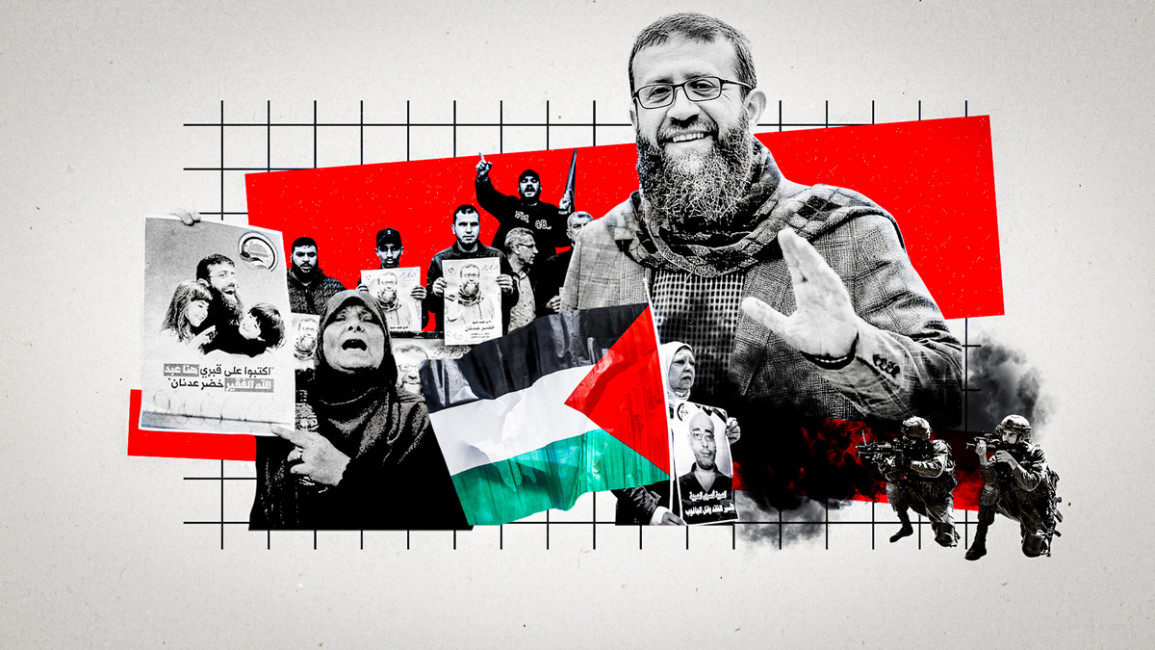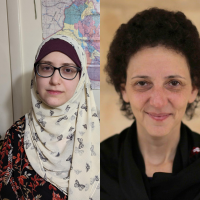
Israel's carceral system will not defeat Palestinian resistance
As Palestinians in Palestine and the diaspora commemorate the 75th year of their 1948 Nakba, when more than 750,000 Palestinians were ethnically cleansed from their homeland and made refugees by Zionist forces, the settler-colonial carceral system continues to control, fragment, and torture Palestinian bodies and souls.
Walid Daqqa, one of the longest serving Palestinian political prisoners, writes in In Searing of Consciousness: or On Redefining Torture (2010) that:
“The body of the political prisoner… is no longer the target. But what is targeted is their mind and soul… what is happening in the [Israeli] prisons is not just the detention and isolation of political prisoners. Rather, it is part of a comprehensive deliberate plan that aims to change Palestinian national consciousness.”
Daqqa, who remains incarcerated in Israeli prison despite his rapidly deteriorating condition from cancer, knows firsthand how the carceral system is built to destroy the political prisoner from within.
"The prison does not just torture the body, it also aims to crush the soul, embed fear, quell dissent, and fracture any hopes and visions for liberation"
The prison does not just torture the body, it also aims to crush the soul, embed fear, quell dissent, and fracture any hopes and visions for liberation. Under these circumstances, Daqqa asserts that the political prisoners' struggle is a political one, not a humanitarian or rights-based issue.
The carceral system – with all its mechanisms of torture – should be understood as part of a broader settler-colonial project that the Zionists started in the early 20th century, before the widely recognized Nakba, with the ultimate aim of eradicating Palestinian society.
Colonial forces, first British and later Israelis, have assassinated and imprisoned generations of Palestinian leaders and revolutionaries to crush their collective resistance, fracture existing political networks, and demoralise the masses.
This is best illustrated in the 1936-1939 Great Revolt, when Palestinian masses mobilised against the combined forces of British imperialism and Zionist settler-colonialism. Despite their militancy, British and Zionist forces brutally crushed this popular struggle, killing, wounding, imprisoning, and exiling at least 10 percent of the native male population. From then onward, the Zionist colonial project knew that it needed to intensify its physical and psychological warfare on the natives to survive.
The ongoing case of political prisoner Walid Daqqa is a reminder of the brutal treatment in Israeli prisons. But his commitment to the Palestinian struggle reminds us that Palestinian consciousness cannot be quelled, writes @palyouthmvmt's @yxs_min ⬇https://t.co/4xD2prFyq1
— The New Arab (@The_NewArab) April 17, 2023
The intensification of Israel’s colonial violence was on full display during the Nakba. Between 1947-1948, Zionist forces deliberately destroyed 531 Palestinian villages, committed more than 70 massacres, and expelled around a million men, women, and children.
The Israeli carceral regime at this historical juncture was built both physically and legally to control the small Palestinian population that remained within its borders, and to prevent the hundreds of thousands of Palestinians who had been expelled from returning to their homeland.
Since 1967, Israel has imprisoned approximately one million Palestinians, including women, elderly, and children. It is not an exaggeration to say that almost every Palestinian family has suffered from the Israeli carceral system.
The collective incarceration of Palestinian society is not about ‘security’ as the Zionist forces claim. It is a deliberate colonial practice that is central to the continuation of the Zionist project in Palestine with its aim to fragment and destroy Palestinians' resistance, psyche, and morale.
Over the years, approximately 237 Palestinians have been killed in Zionists prisons due to torture, willful killing, and medical negligence (which will most likely kill Daqqa). Most recent is the assassination of political prisoner Khader Adnan, who was found dead in his prison cell after being on a hunger strike for 87 days.
From the town of Arrabeh, the 45-year-old was a resistor, a caring father of nine, a loving husband to Randa, and an inspirational figure for thousands of Palestinians in historic Palestine and beyond. Adnan was a graduate of mathematics from Birzeit University and a baker.
Many believe Adnan, whom Israel arrested 12 times throughout his life, went on six hunger strikes to protest Israel's illegal administrative detention, a practice inherited from its British predecessor that allows Israeli forces to imprison Palestinians without trial or charges indefinitely. Others believe he was protesting the torture, solitary confinement, ban on family visits, strip searches, and other dehumanising policies Palestinian prisoners are subjected to.
But such explanations obscure the central motive behind Adnan's resistance and what he stood for his entire life: the liberation of Palestine and the freedom and unity of his people. Adnan wanted the ongoing Nakba to end.
Adnan knew very well that the fate of the Palestinian political prisoners and Palestinians outside were deeply intertwined. His resistance in the prison aimed to impact the reality of Palestinians, both inside and outside of prison.
Israeli settler-colonialism has placed Palestinians in a large prison wherein Palestinians live under different forms of violence that divide the collective Palestinian body and destroy its identity. The most extreme manifestation of this divide is seen in Gaza, the world’s largest open-air prison with a population confined to 365 square kilometres.
Adnan understood that Palestinians could not liberate their land without the coordination between the resistance inside the prison and outside of it, both in historic Palestine and the diaspora. Hunger strikes have been utilised as a catalyst to mobilise demonstrations outside.
Adnan embodied what he preached, and Israel killed him for it.
"Israel has failed to quell Palestinian resistance and national consciousness. In fact, its increased colonial violence towards Palestinians reveals the fragility of its system"
As a political leader and revolutionary, Adnan deeply impacted Palestinians across the globe who remember him as a loving, virtuous, educated, and incorruptible figure. Outside the prison, Adnan protested, urged people to defend the plight of the political prisoners, and cared for their families.
Inside the prison, he organised his comrades and led six hunger strikes. The death of Adnan inside a prison cell, despite repeated calls for his release, was not an accidental anomaly. Rather, it is an ongoing tactic used by the Israeli regime to dehumanise those who refuse to surrender.
Despite international financial and military backing of Israel’s institutionalised violence that permeates all facets of Palestinian lives; the condemnation of any act of Palestinian resistance (always stripped from its political and revolutionary force); the systematic assassination of Palestinian leaders, intellectuals, journalists, and fighters; and the complicity of the PA and Arab regimes in the colonisation of Palestine, Israel has failed to quell Palestinian resistance and national consciousness.
In fact, its increased colonial violence towards Palestinians reveals the fragility of its system.
Palestinians in historic Palestine and the diaspora continue to fight and resist through the pen, armed struggle, protests, and hunger strikes. All these acts give Palestinians courage and hope: the courage to continue their resistance and the hope for a liberated future.
The hope is seen in Khader Adnan’s son, lifted on a Palestinian shoulder, courageously leading the crowds in protests after his father's murder, and in his wife Randa’s piercing words urging us to continue fighting for freedom, despite her deep grief and sadness.
The courage is passed on to us through Khader Adnan’s legacy and words: “My stance will always be with the prisoners, whether next to them, behind them, or in front of them. From the Gaza Strip to the West Bank to the ’48 territories and the exile, every Palestinian is obliged to stand united.”
Samar Saeed is a Ph.D. candidate in the History Department at Georgetown University.
Have questions or comments? Email us at: editorial-english@newarab.com
Opinions expressed in this article remain those of the author and do not necessarily represent those of The New Arab, its editorial board or staff.




